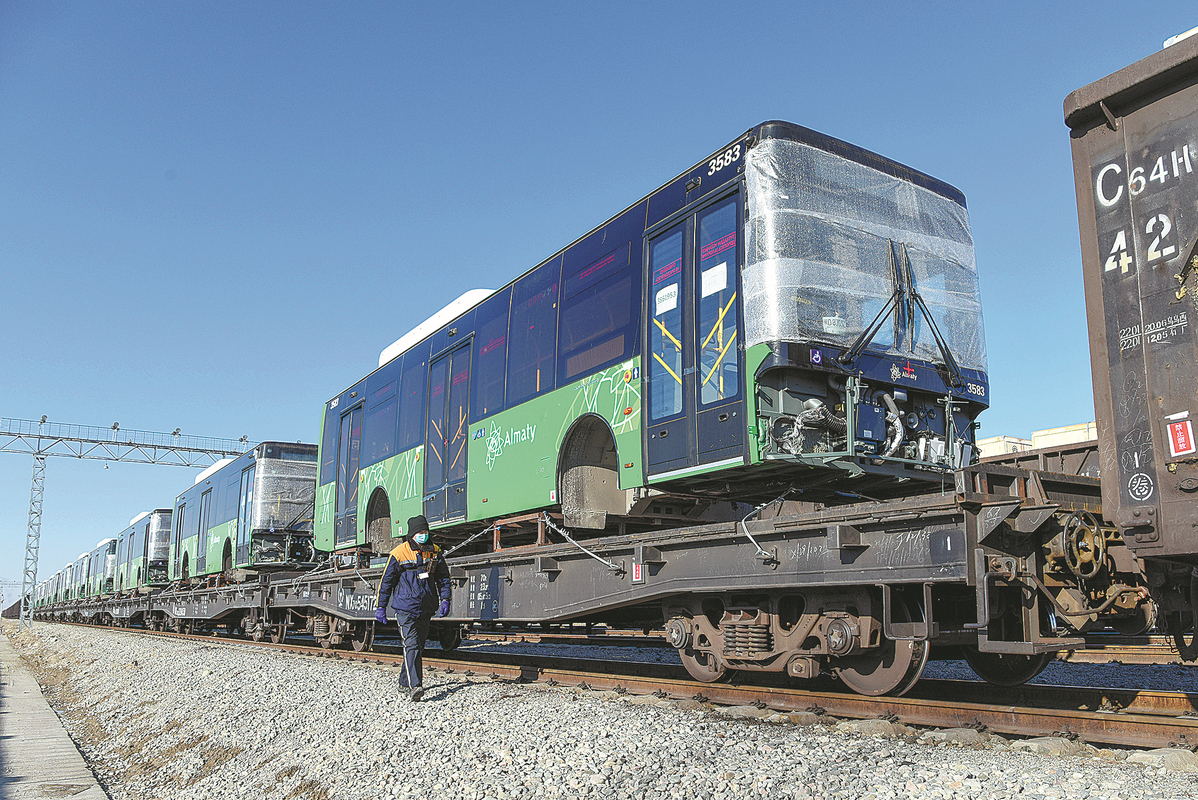Xinjiang enterprises go full throttle to boost trade

An employee checks a freight train before departing from Horgos, Xinjiang Uygur autonomous region, for European markets. [DING LEI/XINHUA]
Despite COVID headwinds, firms in autonomous region ride BRI for momentum
URUMQI — Walking into a factory operated by Saurer Xinjiang Intelligent Machinery Co Ltd, one finds a busy scene, with technicians remotely controlling laser cutters and smart vehicles shuttling among assembly lines to transport materials.
"Our employees are now working overtime every day to meet the deadline for a batch of compact-spinning machines which will be exported to Turkiye," said Yan Yue, a manufacturing engineer at the company.
Yan added that 85 percent of the order, with a total value of nearly 100 million yuan ($14.39 million), has been completed, and all products will be manufactured before the end of December as planned.
Saurer mainly produces intelligent spinners for Northwest China's Xinjiang Uygur autonomous region and markets along the Belt and Road. However, its production was affected by COVID-19 outbreaks this year.
Many localities across China are moving quickly to boost foreign trade and investment as the country has adjusted its COVID-19 response to facilitate the orderly recovery of normal life and production.
"As Xinjiang has further optimized COVID-19 response measures, helping enterprises solve difficulties in logistics and transportation and boosting work resumption, our production targets for this year can basically be achieved," said Pei Guoqing, head of the company.
The Xinjiang branch of Shaanxi Automobile Group has exported 50 tractors to Central Asia since late November, when it gradually resumed production, according to Shi Xinli, deputy general manager of the company.
"Apart from the Xinjiang market, our products such as dump trucks and towing vehicles are also gaining increasing popularity in foreign markets such as Russia and some Central Asian countries," Shi said.
This year, Chinese authorities at all levels have rolled out a string of favorable policies for COVID-19-hit enterprises and ratcheted up efforts to smooth industrial and supply chains.
The Industry and Information Technology Department of Xinjiang has coordinated efforts to support "white list" companies in product sales, the procurement of raw materials and spare equipment parts, key project construction and cargo transportation, as they resume production amid the pandemic.
So far, more than 70 major firms with annual main business revenues of at least 20 million yuan in Xinjiang have resumed work and production, the department said.
On Dec 12, representatives of industry-leading enterprises from Xinjiang departed on a trip to Central Asian countries including Kazakhstan, Tajikistan, Kyrgyzstan and Uzbekistan to seek business opportunities.
During the 10-day trip arranged by the regional government, Xinjiang businesses are expected to establish new contacts, engage in business negotiations and attend trade fairs.
Parhati Memetiyimin, executive vice-general manager of Xinjiang Zhongtai (Group) Co Ltd, said the company will sign a large deal for chemical exports to Kazakhstan. The company is also seeking crude oil import opportunities during the trip, he added.
 Attractions
Attractions Dining
Dining Culture
Culture